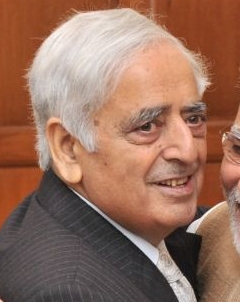
Mufti Mohammad Sayeed was an Indian politician from the state of Jammu and Kashmir. He started in the wing of the National Conference led by G. M. Sadiq, which later merged into the Indian National Congress. He switched to Janata Dal in 1987, eventually founding his own regional party, People's Democratic Party (PDP). He served twice as the Chief Minister of Jammu and Kashmir, during November 2002–November 2005 and March 2015–January 2016. He was also Minister of Tourism in Rajiv Gandhi's cabinet and Home Minister of India in V. P. Singh's cabinet. The PDP continues to be a political force in Jammu and Kashmir, currently led by his daughter Mehbooba Mufti.

Syed Ali Shah Geelani (1929–2021) was an Islamist, pro-Pakistani, Jihadist, Kashmiri-separatist leader in the Indian union territory of Jammu and Kashmir, regarded as the father of the Kashmiri jihad.
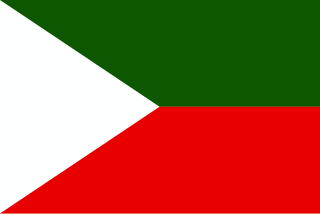
The Jammu Kashmir Liberation Front (JKLF) is a militant separatist organization active in both the Indian-administered and Pakistani-administered territories of Kashmir. It was founded by Amanullah Khan, with Maqbool Bhat also credited as a co-founder. Originally a militant wing of the Azad Kashmir Plebiscite Front, the organization officially changed its name to the Jammu Kashmir Liberation Front in Birmingham, England on 29 May 1977; from then until 1994 it was an active Kashmiri militant organization. The JKLF first established branches in several cities and towns of the United Kingdom and other countries in Europe, as well as in the United States and across the Middle East. In 1982, it established a branch in the Pakistani-administered territory of Azad Jammu and Kashmir, and by 1987, it had established a branch in the Indian-administered Kashmir Valley.
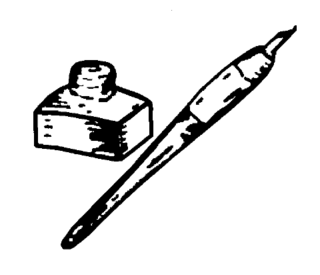
The Jammu and Kashmir Peoples Democratic Party (PDP) is a state political party in Jammu and Kashmir, India. The PDP was headed and founded by Mufti Mohammed Sayeed. His daughter, Mehbooba Mufti, succeeded him as party leader and as Chief Minister of Jammu and Kashmir following his death in January 2016. The party is a member of the People's Alliance for Gupkar Declaration electoral alliance.
Operation Tupac is the codename of an ongoing military-intelligence contingency program that has been active since the 1980s and run by Pakistan's main intelligence agency Inter-Services Intelligence (ISI). It has a three-part action plan to provide covert support to anti-India separatists and militants in Indian-administered Kashmir. The program was authorized and initiated in 1988 by the order of the then-President of Pakistan, Muhammad Zia-ul-Haq.
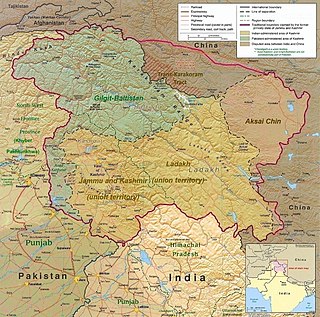
The Kashmir conflict is a territorial conflict over the Kashmir region, primarily between India and Pakistan and also between China and India in northeastern portion of the region. The conflict started after the partition of India in 1947 as both India and Pakistan claimed the entirety of the former princely state of Jammu and Kashmir. It is a dispute over the region that escalated into three wars between India and Pakistan and several other armed skirmishes. India controls approximately 55% of the land area of the region that includes Jammu, the Kashmir Valley, most of Ladakh, the Siachen Glacier, and 70% of its population; Pakistan controls approximately 30% of the land area that includes Azad Kashmir and Gilgit-Baltistan; and China controls the remaining 15% of the land area that includes the Aksai Chin region, the mostly uninhabited Trans-Karakoram Tract, and part of the Demchok sector.
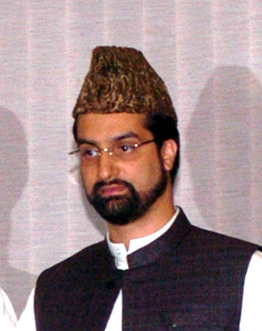
Mirwaiz Mohammad Umar Farooq is the Mirwaiz of Kashmir. He is an Islamist, separatist political leader of Kashmir. He is also an Islamic religious cleric of Kashmir Valley.

Maqbool Bhat also spelt Maqbool Butt was a Kashmiri separatist leader who migrated to Pakistan and founded the militant group National Liberation Front (NLF), which was a precursor to the present day Jammu Kashmir Liberation Front (JKLF). Bhat carried out multiple attacks in Jammu and Kashmir (state). He was captured, tried and convicted, receiving double death sentence. He was hanged on 11 February 1984 in Tihar Jail in Delhi.
In 1989, Rubaiya Sayeed, the daughter of the then Indian Home Minister Mufti Mohammad Sayeed, was kidnapped by Kashmiri separatist militants in Srinagar, the capital of Jammu and Kashmir. The kidnappers demanded the release of five jailed members of Jammu Kashmir Liberation Front (JKLF) in exchange for Sayeed's release. The Indian government headed by V. P. Singh of the Janata Dal party, with outside support from the BJP, agreed to the demands and induced the state government to release the jailed militants. In 2004, the JKLF admitted to having carried out the kidnapping, and the court case is ongoing. In July 2022, Rubaiya identified Yasin Malik, one of the key leaders of JKLF at that time, as one of her kidnappers.
Sajad Gani Lone is an Indian politician, and former Member of the Legislative Assembly elected from the Handwara constituency. He is the chairman of Jammu and Kashmir People's Conference.
On 26 May 2008, the government of India and the state Government of Jammu and Kashmir reached an agreement to transfer 99 acres (0.40 km2) of forest land to the Shri Amarnathji Shrine Board (SASB) in the main Kashmir valley to set up temporary shelters and facilities for Hindu pilgrims. This caused a controversy, with demonstrations from the Kashmir valley against the land transfer and protests from the Jammu region supporting it. The largest demonstration saw more than 500,000 protesters at a single rally, among the largest in Kashmir's history.
Elections for the Indian state of Jammu and Kashmir were held over seven days in November and December 2008. The previous government led by the Jammu and Kashmir People's Democratic Party (PDP) in coalition with the Indian National Congress (INC) collapsed when the PDP withdrew. Following the election, the Jammu & Kashmir National Conference (NC) agreed on a coalition with Congress and their leader, Omar Abdullah became the state's youngest-ever Chief Minister at 38.

Hashim Qureshi is a pro-Kashmiri leader and one of the founding members of Jammu Kashmir Liberation Front (JKLF) and is now the Chairman of Jammu Kashmir Democratic Liberation Party (JKDLP), one of the main Kashmiri political organisations which strives to find a political solution to merge Kashmir with Pakistan through peaceful political activities.

On 30 January 1971, an Indian Airlines domestic Fokker F27, also named "Ganga", flying from Srinagar Airport to the Jammu-Satwari Airport, was hijacked by two Kashmiri separatists belonging to the National Liberation Front. The hijackers were Hashim Qureshi and his cousin Ashraf Qureshi. The aircraft was flown to Lahore Airport in Pakistan where the passengers and the crew were released and the aircraft was burnt down.
Secession in India typically refers to state secession, which is the withdrawal of one or more states from the Republic of India. Whereas, some have wanted a separate state, union territory or an autonomous administrative division within India. Many separatist movements exist with thousands of members, however, some have low local support and high voter participation in democratic elections. However, at the same time, demanding separate statehood within under the administration of Indian union from an existing state can lead to criminal charges under secession law in India. India is described as a ‘Union of States’ in Article 1 of the Indian constitution I.e indestructible nation of destructible states where a state or Union territory of India can't secede from India by any means.
Elections for the former Indian state of Jammu and Kashmir were held in September -October 2002 in four phases.

The Exodus of Kashmiri Hindus, or Pandits, is their early-1990 migration, or flight, from the Muslim-majority Kashmir valley in Indian-administered Kashmir following rising violence in an insurgency. Of a total Pandit population of 120,000–140,000 some 90,000–100,000 left the valley or felt compelled to leave, and about 30 were killed. During the period of substantial migration, the insurgency was being led by a group calling for a secular and independent Kashmir, but there were also growing Islamist factions demanding an Islamic state. Although their numbers of dead and injured were low, the Pandits, who believed that Kashmir's culture was tied to India's, experienced fear and panic set off by targeted killings of some high-profile officials among their ranks and public calls for independence among the insurgents. The accompanying rumours and uncertainty together with the absence of guarantees for their safety by India's federal government might have been the latent causes of the exodus. The descriptions of the violence as "genocide" or "ethnic cleansing" in some Hindu nationalist publications or among suspicions voiced by some exiled Pandits are widely considered inaccurate, aggressive, or propaganda by scholars.

The Plebiscite Front in Azad Kashmir, also called Mahaz-i-Raishumari, was founded by Amanullah Khan in collaboration with Abdul Khaliq Ansari and Maqbool Bhat in 1965. The organisation had an unofficial armed wing called National Liberation Front, which carried out sabotage activities in Jammu and Kashmir as well as the hijacking of Ganga. Amanullah Khan later moved to England, where he revived the National Liberation Front under the new name Jammu Kashmir Liberation Front (JKLF).

Jammu and Kashmir is a region administered by India as a union territory and consists of the southern portion of the larger Kashmir region, which has been the subject of a dispute between India and Pakistan since 1947, and between India and China since 1962. The Line of Control separates Jammu and Kashmir from the Pakistani-administered territories of Azad Kashmir and Gilgit-Baltistan in the west and north. It lies to the north of the Indian states of Himachal Pradesh and Punjab and to the west of Ladakh which is administered by India as a union territory.
The Mehjoor Nagar Sikh massacre refers to the fatal shooting of Sikhs on 3 February 2001 in the Srinagar district of Jammu and Kashmir, India. In this attack, at least six people were killed in a drive-by shooting and five were injured. The Mehjoor Nagar attack was the second big attack on the Sikh community of Kashmir – in March 2000, unknown gunmen committed a mass massacre of 35 Sikhs in Chithi Singh Pora.










